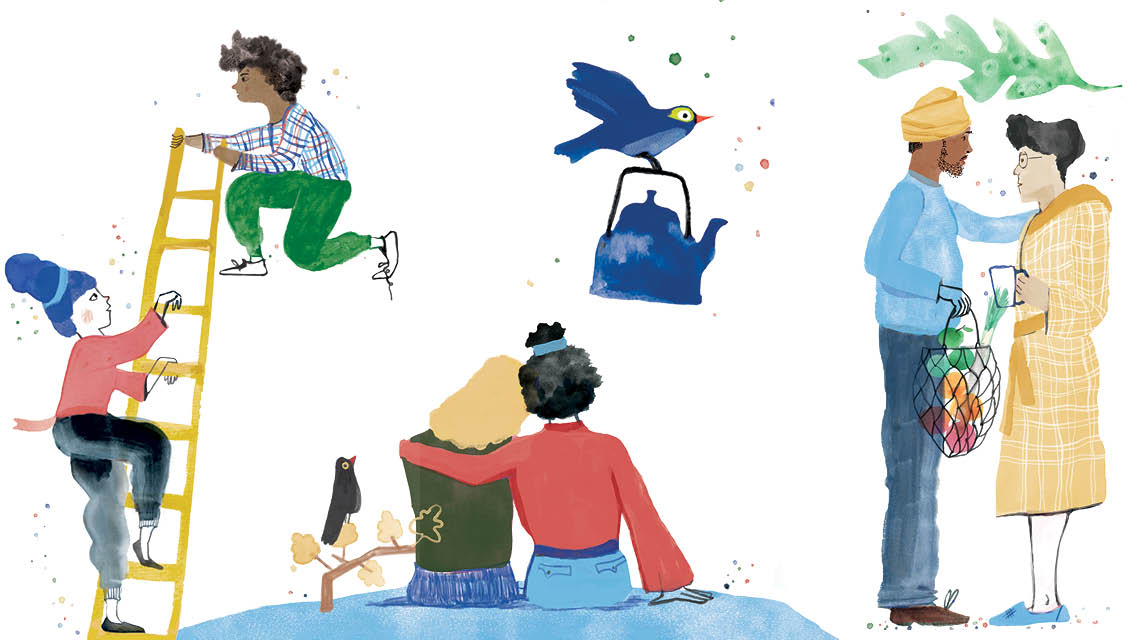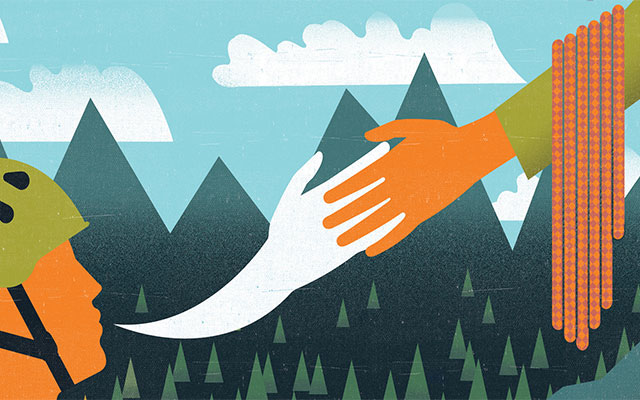Maybe it’s running an errand for us when we’re swamped, explaining a complicated problem, or fulfilling a bigger, more demanding request. Whatever the reason, we all need someone else’s help from time to time. Still, the prospect of asking for support can be even more stressful than the problem that sent us looking for it in the first place.
Chicago-based business coach M. Nora Bouchard, MA, PCC, author of Mayday! Asking for Help in Times of Need, uses two words — “fear” and “shame” — to explain our hesitation. But she also acknowledges that it can be genuinely difficult to determine whom and how to ask, and she offers some suggestions to help us figure it out.
Stress Sources
Concerns of seeming incompetent or lazy. “If we confess to needing help on something specific,” says Bouchard, “we might fear that what we’re really saying is that we’re unable or unwilling to deal with other things — maybe everything — in our lives.” This thinking is based on the feeling that we really ought to be able to run our own lives without help, and that if we can’t, we’re a failure.
Fear that our independence will be compromised. Americans are taught to “stand on our own two feet,” Bouchard says. The idea of independence — political and personal — is part of our national DNA.
For women, independence has a particular poignancy. “I coach a lot of female leaders,” she notes, “and many of them have seen women dependent on their husbands or other male partners. They’ve sworn that this would never happen to them.” Asking for help can sometimes seem like entering the kind of dependent relationship we’ve worked to avoid.
The possibility of being ostracized. Especially if we have asked for help before, we may fear that doing so again might label us as “needy,” Bouchard explains. “And we worry that might lead to being subtly ostracized by our workmates or some other group we belong to.”
Making assumptions about how others will respond. We may assume that people are too busy or that they don’t really want to help, she says. “Or that they have their own issues to deal with, and those issues are much more important to them than my problem.” They’re going to say no, we assume — or if they say yes, they’re going to say it unwillingly and resentfully.
Context-based insecurity. Hesitating to ask for support may have a lot to do with the context in which you’re asking. “Some people are actually very comfortable asking for help at work,” Bouchard observes. “But it’s at home, within their family, that they are worried and hesitant.”
Gender stereotypes might play a role here; a man might feel that he ought to know how to make minor repairs around the house, for example, and be hesitant to ask for help when he’s actually clueless. When asking friends or non-immediate family for support, a similar unease can surface: You might worry that your relationship isn’t close enough for this sort of request.
Not knowing whom to ask. Separate from our hesitations based on a sense of our own possible inadequacy or neediness, there’s the problem of figuring out who can really help us.
Strategies for Success
Reframe your request as a skillful move. Rather than a reflection of cluelessness, seeking support is really a form of mature, rational problem-solving, Bouchard argues. What’s truly irrational is the idea that anyone, including you, could possibly handle everything alone.
Consider the value of inter-dependence. We all depend on other people all the time, whether it’s to make deliveries, follow traffic laws, prepare meals, or keep the environment clean and orderly — the list goes on. You already need other people, and they need you. Asking for help is simply one form of this general interdependence that helps define human existence.
Know that assisting you will usually make your helper feel good. To illustrate this point, Bouchard tells a personal story. “I was getting on an airplane,” she recalls, “and a gentleman offered to help me put my suitcase in the overhead rack. I refused and refused, but he kept offering. When I finally agreed, the look on his face was so wonderful! He was so happy to help me. And it just hit me hard.” Most people are flattered and gratified by being asked for help; after all, it’s a vote of confidence in their competence and general goodness.
Make the request a conversation, not a plea. One of the best ways to avoid appearing needy — and to underline the rational, problem-solving aspect of asking for help — is to initiate the ask as a simple, open-ended conversation. “Having a discussion about what you’re facing, what you think about it, and where you feel you might need some help is a start,” Bouchard advises. “You can sit down with the person over coffee and ask them if they would be willing to brainstorm some solutions with you.”
Use the conversation to assess your potential helper. Another benefit of the conversational approach, she says, is that the other person’s response will clarify how helpful they might be and how willing they are to help. “Even if the person says yes, they’ll help you, you might hear some hesitation,” she notes. “So you can say, ‘OK, I hear that you’re hesitating a little. What are your concerns? What can we work through to make this work for both of us?’”
By the same token, the conversation can hint at whether the other person has the knowledge that you need to solve your problem. “If they’re stymied by your problem themselves or they just don’t know what you need, you can move on.”
Ask early. Hesitation to ask naturally produces procrastination, so a problem that would be easy to solve in its early stages becomes a bigger deal — and a more difficult ask — as time passes. Bouchard suggests initiating the I-need-help conversation at the first hint of difficulty. “Don’t wait until things are dire,” she says. “Let people know that you’re working on something and you may need their help in the near future.”
Realize that a no isn’t the end of the world. “Honestly, most people will say yes to a request for help,” she notes. “It’s unusual for someone to flat-out say no. But even if they do, you can ask them to point you in the right direction, to someone else who could help you.”
Renewal
For more inspiration and strategies to overcome life’s challenges, please visit our Renewal department.
This article originally appeared as “With a Little Help From My Friends” in the January/February 2023 issue of Experience Life.





This Post Has 3 Comments
This was such a helpful article. Life has served up heavy challenges and as this landed in my inbox offering tremendous insight and inspiration, a trainer at my local club, Kasia saw that I was very down and she wandered my way to ask if I was ok. It was a relief to say, No, but I couldn’t discuss it. Kasia told me, “We’re here for you.” That was uplifting and while I don’t know how long I’ll still be able to be a member it was wonderful to see someone cared. With the suggestions in this article and the thoughtful staff, I hope to activate this in my future. Thank you.
This is excellently presented. A situational concern that presents itself almost daily throughout life. Grateful for your share.
Very well said.